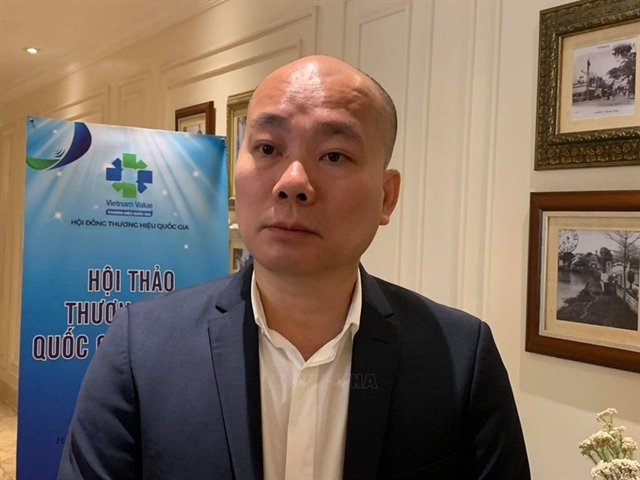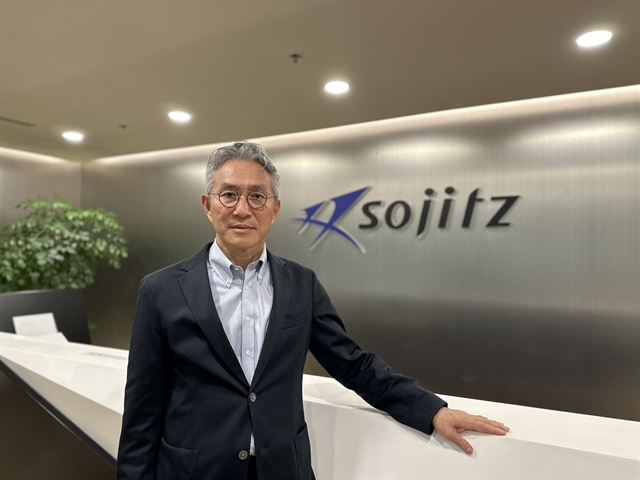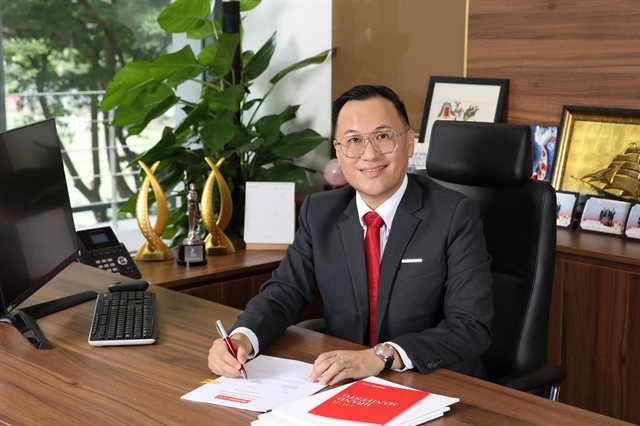 Talking Shop
Talking Shop

Việt Nam's economy came to the end of a difficult year in 2023, with global growth slowing down. Nevertheless, Việt Nam's economic development has shown its resilience and readiness to overcome challenges to become one of the world's economies with positive growth rates.
The economy in 2023 still had many shortcomings, as a weaker-than-expected recovery of external demand continued to hinder Việt Nam's domestic growth. Leaders from foreign-invested companies spoke with Việt Nam News reporters Vũ Hoa and Thu Ngân to evaluate the picture of Việt Nam's economic growth and their key focuses for the year ahead.
 |
| Stuart Livesey, Chief Executive Officer for Copenhagen Offshore Partners (COP) |
Stuart Livesey, CEO of La Gàn Offshore Wind & representative of Copenhagen Infrastructure Partners (CIP) in Việt Nam
CIP is the world's largest investor in greenfield energy projects. We focus on the development and construction of many different types of renewable energy including offshorew wind, onshore wind, solar, hydrogen, biomass, green transmission and storage solutions.
In Việt Nam, offshore wind is one of the most interesting sectors for CIP as the country is extremely well-placed to deliver this to contribute to energy demand, transition from fossil fuels, maximise the use of optimum wind conditions, and utilise the existing and future supply chain and labor capabilities.
Việt Nam possesses some of the best offshore wind speed in Asia. This along with a fairly shallow seabed, provides an optimum landscape for green energy, as reinforced by Prime Minister Phạm Minh Chính at COP26. Many international investors are now positively seeking green energy supply as commitments from their own companies and foreign markets have more of a carbon footprint focus.
At this time, there are some concerns related to the progress and delivery of renewable energy projects due to the delays and uncertainty on regulations and policies, grid readiness, and offtake mechanisms.
As you can see from Power Development Plan 8 (PDP8) that was issued on 15 May last 2023, there is a significant plan for offshore wind to be part of Việt Nam's energy mix going up to 2050. The first goal in 2030 is to deliver 6,000MW split between regions in the North and the South, which is a huge capacity for a new market. That target is deliverable but will be highly challenging without significant progress imminently, and 2024 is the year that decisions and mechanisms need to occur to enable offshore wind to be delivered.
We're expecting key enabling policies to start being applied and enforced soon, such as Decree 11, which will under the remit of the Ministry of Natural Resources and Environment (MONRE), allowing developers to survey the sea areas to identify suitable sites and design of the farms; the Marine Spatial Plan (again under MONRE) to identify most suitable areas for offshore wind development; and a clear and detailed PDP8 Implementation Plan and investor selection process under the remit of the Ministry of Industry and Trade, supported by the Ministry of Planning and Investment and coordinated by the Office of the Government.
Regarding the ability to deliver green energy into the grid, the first thing is to make sure that there's a mechanism in place where renewable energy producers such as CIP can sell energy to Việt Nam Electricity (EVN) through what's called power purchase agreements (PPAs). Finally, instead of only selling electricity to EVN to benefit Việt Nam’s grid broadly, there are also opportunities to sell green energy directly to high-energy demanding consumers that have a goal of securing power from renewable sources, which requires direct power purchase agreements (DPPAs) to be established .
Since CIPs first days in Vietnam in 2019, we've already adapted the way of working with a large local team, a range of local partners, and supporting the Vietnamese supply chain to be used for offshore wind projects in other markets. CIP has modified its strategy in Việt Nam to support key stakeholders, and transfer lessons learnt from other markets around the world. We’ve been engaging with many business associations, companies, potential partners, and possible off-takers to get a strategy in place when the government can make these decisions on regulations and policies.
In 2024, our target is to help establish the core roots of the offshore wind market in Việt Nam, as decisions and milestones need to be hit this year to ensure Việt Nam does not miss out on this ‘window of opportunity’ for its people, its businesses, and for increased foreign investment. CIP have been established in Việt Nam for over 4 years and are committed to being a long-term green partner for many years to come – you can count on us to deliver.
 |
Michele Wee, CEO of Standard Chartered Vietnam |
Michele Wee, CEO of Standard Chartered Vietnam:
I think there is a focus on three key things.
The first one is accelerating net zero. The second is on lifting participation and basically, it's about focusing on female participation in the economy. And the last one is about resetting globalisation, where we look at transparently providing products and services across all our corporates.
I think that this strategy for us has been working very well. We have been partnering with the Vietnamese government, especially in sustainability. We have been with Việt Nam, from COP26, COP27 and COP28. We will continue to support the ambitions of Việt Nam.
We also know that the sustainable financing portion is a huge opportunity, but also a challenge for the Vietnamese Government. We were on that journey. But this is not a 2024 trend, but it's a trend that basically started two years ago and certainly this year, and I believe that there will be an acceleration because of the resource mobilisation plan.
We'll be looking at this year to see how we can execute this plan and how we can contribute, and clearly it's got a lot to do with the Vietnamese government. But where the private sector comes in and whether there's thought leadership is something that we want to contribute to. So that's a huge opportunity for Việt Nam, both from an export perspective, and attracting the right kind of foreign direct investment into the country.
Standard Chartered will continue to work with the State Bank of Việt Nam, to continue to enhance the legal framework to make a stronger financial sector. So that's something that we contribute to very significantly and through the banking working group as well. The digital transformation theme of the country is also clearly a big agenda. We have our own technology stack. We are certainly on this journey as well, and we will continue to support a cashless society, and we will continue to support a digital transformation with the government. Then, of course, there is the usual business and supporting credit, and also credit growth of the country.
We will look at traditional business, definitely finance, and the Blockchain supply chain. All the usual things that we've been doing for many years. After 120 years, we'd like to think that we know what we're doing. In the retail space, we offer products and services that are relevant to the growing affluent of Việt Nam and these are also crucial. We will be looking at products, which are more wealth management, and this is a big opportunity, I believe, and much needed for the Vietnamese community.
 |
| Kinoshita Tadahiro - CEO of Sojitz Vietnam |
Kinoshita Tadahiro - CEO of Sojitz Vietnam
Although the GDP growth in 2023 was 5.05 per cent and did not reach the government’s set target of 6-6.5 per cent, the positive news was that the growth rate in the fourth quarter last year was 6.72 per cent compared to the same period in 2022, showing signs of economic recovery.
However, I am concerned about the slump in consumption in 2024. Until there is a clear resolution to the real estate issue, consumer sentiment would be likely to remain on the defensive.
In addition, domestic demand is starting to slow down again in China, where the real estate market continues to slump, and the US economy is also slowing, with exports starting to slow down. As economic analysts predict, the first half of this year is expected to face challenges. Furthermore, delays in government approval processes also affect projects.
One of our focus this year is to bring Đại Tân Việt Company (DTV) - the largest commercial food company in which we bought all the shares last year, into stable operation. We also planned to launch the Sơn Mỹ 1 liquefied gas power project that we have invested in with French power company EDF and other partners.
Việt Nam is one of the important markets for Sojitz. Recently, due to economic growth leading to an increase in consumer shopping capacity, modern retail formats such as supermarkets and department stores have grown rapidly, we are building the value chain of manufacturing, transportation and retail.
With the acquisition of DTV, Sojitz and its joint venture subsidiary – Hương Thủy Company, a large consumer goods distribution company to retail stores, has formed a comprehensive food distribution company including individual retail stores, wholesale stores, and high-end hotels and restaurants. The strategy is to expand sales channels based on the customer networks of both companies.
In addition, Sojitz started construction of the largest beef farm and beef processing factory in Việt Nam in the northern province of Vĩnh Phúc. The factory is expected to come into operation this summer. Sales of products processed at the factory will also begin this year. To put these projects on track, we are also interested in Việt Nam's consumption trends this year.
Regarding the Sơn Mỹ 1 project, having a government guarantee is the key to receiving a loan from the banking group. We seek the government's understanding and prompt support on this point. This project has been approved in Power Development Plan 7. This is the most progressive liquefied gas power project with the participation of foreign capital. Therefore, the progress of this project will affect other projects involving foreign capital and requires quick support from the government.
Despite a temporary economic slowdown, we believe that Việt Nam's long-term economic growth remains unchanged. Therefore, we have no plans to adjust our strategy at this time. Our company continues to focus on the areas including building a food value chain with high added value, and keeping pace with Việt Nam's economic growth.
We would also promote power generation projects using convertible energy such as electricity liquefied petroleum gas, solar power, wind power and other renewable energies as well as generating electricity using biomass, to achieve emissions targets carbon-neutral by 2050 set by the Vietnamese government while developing smart industrial parks with low impact on the environment.
 |
| Mike Zhang - Head of Việt Nam Business at Alibaba.com |
Mike Zhang - Head of Việt Nam Business at Alibaba.com
We are optimistic about the Vietnamese economy in 2024. This is driven by several factors, including strong global demand for Vietnamese products, a growing domestic market, and continued government investment.
Alibaba.com is a leading platform for global B2B e-commerce. With the global B2B e-commerce market projected to reach a staggering US$26.59 trillion by 2030, this presents a golden opportunity for Vietnamese SMEs to enter the global trade arena. By effectively leveraging B2B e-commerce platforms like Alibaba.com, Vietnamese businesses can access a vast international customer base, diversify their markets, and achieve sustainable growth.
Data from Alibaba.com indicates a burgeoning demand for eco-friendly products worldwide, presenting a significant opportunity for Vietnamese enterprises. The product sectors primed for robust export growth encompass food and beverage, agriculture, home and garden, furniture, and beauty. This fortuitous alignment coincides with five Vietnamese product categories already demonstrating vigorous export expansion. These five sectors flourish within the Vietnamese market and feature among the top eight categories in high demand by active international buyers on Alibaba.com.
Alibaba.com's mission is to support Vietnamese SMEs in accessing export opportunities and trading globally.
To better support local SMEs, we will continually develop and introduce innovative solutions to streamline their business operations, such as Trade Assurance, which was launched in 2023 to enable secure and effortless transactions, thus building trust in international trade engagement.
Furthermore, we will continue to offer an abundance of training and market insights, as well as personalised one-on-one coaching and consulting services. By providing more hands-on guidance, we aim to empower SMEs to trade globally with effectiveness.
Recognising Việt Nam as a burgeoning manufacturing hub and a top global exporter of several key products, we plan to diversify our platform's offerings to assist Vietnamese SMEs in promoting and strengthening their international brand presence.
Our ongoing support for local SMEs is a critical aspect of Alibaba.com's strategy, enabling them to capitalise on global e-commerce for growth. Initiatives such as the Việt Nam Pavilion and collaborations with the Ministry of Industry and Trade and the Việt Nam Trade Promotion Agency underscore the quality of Made-in-Vietnam goods and facilitate international trade.
In 2024, Alibaba.com will continue to invest in the Vietnamese market, unveiling new products and services specifically tailored for Vietnamese businesses.
 |
| Angus Liew - chairman of Gamuda Land Vietnam |
Angus Liew - chairman of Gamuda Land Vietnam
The Vietnamese economy experienced global headwinds in 2023. However, we believe that the Việt Nam market will be stronger in 2024.
In the context of the global economy, Việt Nam remained a bright spot for economic growth, with GDP growth of 5.05 per cent in 2023. Many global organisations such as the World Bank and the United Nations have forecast Việt Nam will achieve better GDP growth in 2024 than in 2023.
From our observations, we think the following factors will positively affect the economic momentum this year.
The Government targets boosting GDP growth from 5.05 per cent in 2023 to 6 per cent - 6.5 per cent in 2024.
The targets for inflation and disbursement of public investment are under 4 per cent and more than 95 per cent.
Việt Nam attracted FDI worth US$36.6 billion in 2023, a 32 per cent increase and has the potential to attract even more this year.
In terms of infrastructure development, the Government is going to meet the target of having 3,000 kilometres of expressways by 2025, and complete and put into operation the Bến Thành - Suối Tiên metro line in 2024.
Other key infrastructure works also have detailed execution plans.
First and foremost, I want to emphasise that Việt Nam is Gamuda Land's most important overseas market now.
Continuing to expand our presence here is a crucial strategic step towards achieving our goal of $2 billion in annual revenues during our five-year plan.
We are truly interested in diversifying our product portfolio in Việt Nam to include high-rise complexes and commercial townhouses, doing acquisitions and developing quick turnaround projects.
Continuing to expand here is a strategically important step for us to achieve our revenue goals and diversify our product portfolio to introduce 10 to 15 new projects in the next five to 10 years.
At the same time expanding land holdings is our top priority at the moment. The lack of sufficient "clean" lands that are fully paid for is the biggest barrier to developing integrated urban projects. Especially in big cities like Hà Nội and HCM City, land is extremely scarce. However, we remain committed to our sustainable development strategy in Việt Nam.
 |
| Naree Nguyễn - head of key account partnerships, TikTok Vietnam |
Naree Nguyễn - head of key account partnerships, TikTok Vietnam
TikTok’s “Shoppertainment 2023: The Future of Consumer & Commerce in APAC, including Vietnam” report reveals a significant shift in consumer behaviour.
It indicates that 1.9 times more consumers actively search for products on content-driven video platforms like TikTok than on traditional search engines, and this trend is on the rise.
Amongst APAC consumers, 93 per cent want to continue or increase their discovery, consideration and purchase of products on all-in-one platforms in the next one or two years.
While 22 per cent of consumers are influenced only by brands, 48 per cent are influenced by content communities, which are networks of brand and product contents that drive interaction and co-creation among consumers and brands.
The integration of content co-creation into the consumption experience is evident, with 73 per cent of consumers participating in “fluid” ways such as contributing to trends and engaging in the comments section.
In light of these trends, TikTok stands out as a leader in the shoppertainment movement, consistently providing content-driven commerce.
Through this approach, brands can connect with consumers, offering not only the best deals but also an entertaining and seamless experience that complements rather than disrupts their digital experience.
VNS




